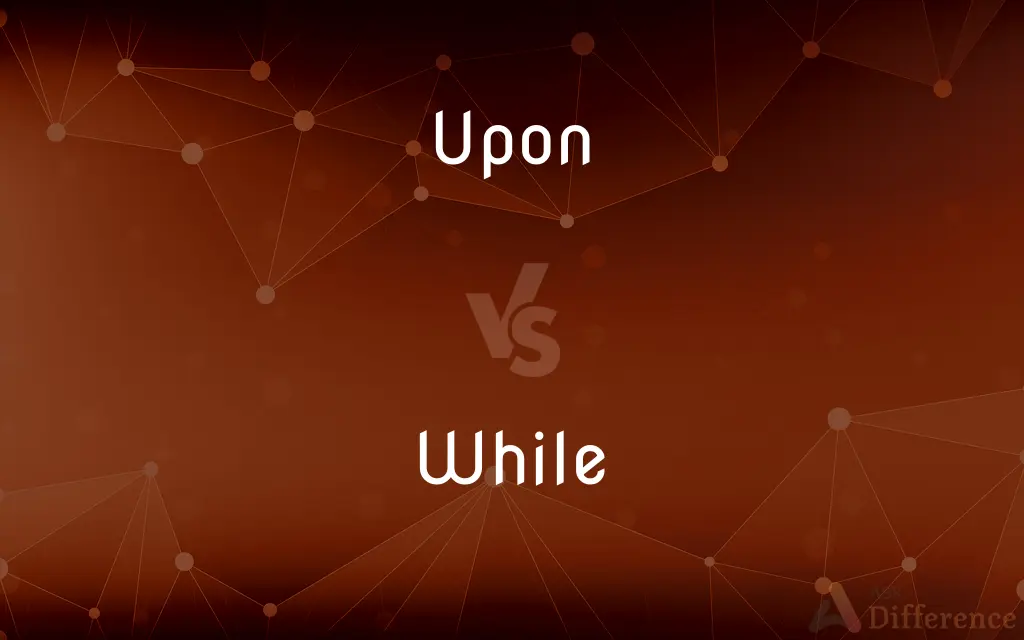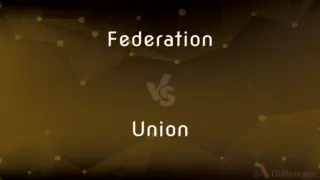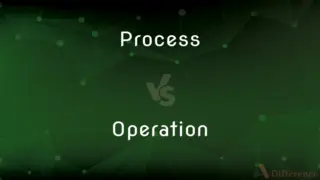Upon vs. While — What's the Difference?
Edited by Tayyaba Rehman — By Fiza Rafique — Updated on October 25, 2023
"Upon" primarily functions as a preposition indicating contact or position. "While" is commonly used as a conjunction or noun to denote a period of time or a contrast. Both words are versatile and can convey various meanings depending on the context.

Difference Between Upon and While
Table of Contents
ADVERTISEMENT
Key Differences
"Upon" is predominantly used as a preposition and often can be interchangeable with the word "on." It suggests the idea of something being on top of or in contact with something else. For instance, one might say "the book is upon the table," to denote the book's position on the table. On the other hand, "while" is primarily utilized as a conjunction to introduce a subordinate clause expressing contrast or an action occurring simultaneously with another. For instance, "I read while he watched TV."
The versatility of the word "upon" is evident in its use to convey immediacy or happening right after an event. For instance, "Upon hearing the news, she cried." Here, the word illustrates something happening immediately after a particular event. In contrast, "while" can denote a period of time, as in "It happened a while ago." In this scenario, "while" points to a vague time in the past.
In some literary or poetic contexts, "upon" might be chosen over "on" for a more formal or traditional feel. For instance, "Once upon a time..." is a classic introduction to many fairy tales. "While," when utilized as a noun, can refer to an interval of time. As in, "It took a short while to complete the task."
Though "upon" and "while" might appear in the same sentence, their functions remain distinct. "Upon" would still primarily deal with contact or position, and "while" would manage the timing or contrasting aspects of the statement. For example, "Upon entering the room, she noticed that while the windows were open, it was still stuffy."
Comparison Chart
Primary Grammatical Role
Preposition
Conjunction or Noun
ADVERTISEMENT
Typical Usage
Indicates contact or position
Denotes time or contrast
Interchangeability
Often interchangeable with "on"
Not typically interchangeable with other common words
Indication of Time
Can indicate immediacy (e.g., upon arrival)
Directly indicates a period of time or simultaneity
Contextual Formality
Can be more formal or poetic than "on"
Common in everyday language, less formal implications
Compare with Definitions
Upon
Immediately following in time.
Upon seeing her, he smiled.
While
During the time that.
She studies while her brother plays.
Upon
Signifying a point in time when something commences.
Upon turning 18, he moved out.
While
Although; even though.
It's simple, while not easy to master.
Upon
On or in contact with something.
The cat slept upon the mat.
While
A period or interval of time.
I haven't seen them in a while.
Upon
Indicating the target or direction of an action.
He wished good fortune upon them.
While
Used to contrast actions or states.
He likes cats, while she prefers dogs.
Upon
Used to indicate the basis or foundation for something.
Decisions were made upon the data collected.
While
While is a word in the English language that functions both as a noun and as a subordinating conjunction. Its meaning varies largely based on its intended function, position in the phrase and even the writer or speaker's regional dialect.
Upon
On
The leaves are scattered upon the grass. He put the book upon the table. Upon hearing the news, we all cheered.
While
A period of time
Stay for a while.
Sang all the while. See Usage Note at awhile.
Upon
Physically above and in contact with.
Place the book upon the table.
While
The time, effort, or trouble taken in doing something
The project wasn't worth my while.
Upon
Physically directly supported by.
The crew set sail upon the sea.
She balanced upon one foot.
While
As long as; during the time that
It was lovely while it lasted.
Upon
Being followed by another so as to form a series.
Hours upon hours, years upon years, mile upon mile of desert
While
In spite of the fact that; although
While that guitar may look nice, it's not a very good instrument.
Upon
At (a prescribed point in time).
The contract was rendered void upon his death.
While
And on the contrary
The soles are leather, while the uppers are canvas.
Upon
On.
While
To spend (time) idly or pleasantly
While the hours away.
Upon
On; - used in all the senses of that word, with which it is interchangeable.
Our host upon his stirrups stood anon.
Thou shalt take of the blood that is upon the altar.
The Philistines be upon thee, Samson.
As I did stand my watch upon the hill.
He made a great difference between people that did rebel upon wantonness, and them that did rebel upon want.
This advantage we lost upon the invention of firearms.
Upon the whole, it will be necessary to avoid that perpetual repetition of the same epithets which we find in Homer.
He had abandoned the frontiers, retiring upon Glasgow.
Philip swore upon the Evangelists to abstain from aggression in my absence.
While
An uncertain duration of time, a period of time.
He lectured for quite a long while.
It’s a long while since anyone lived there, so it’s a ruin now.
While
(US) an uncertain long period of time
While
(Philippines) an uncertain short moment
While
During the same time that.
He was sleeping while I was singing.
Driving while intoxicated is against the law.
While
Although.
This case, while interesting, is a bit frustrating.
While I would love to help, I am very busy at the moment.
While
Until.
I'll wait while you've finished painting.
While
As long as.
While you're at school you may live at home.
While
Until.
While
To pass (time) idly.
I whiled away the hours whilst waiting for him to arrive
While
(transitive) To occupy or entertain (someone) in order to let time pass.
While
To elapse, to pass.
While
Space of time, or continued duration, esp. when short; a time; as, one while we thought him innocent.
This mighty queen may no while endure.
[Some guest that] hath outside his welcome while,And tells the jest without the smile.
I will go forth and breathe the air a while.
While
That which requires time; labor; pains.
Satan . . . cast him how he might quite her while.
And so on us at whiles it falls, to claimPowers that we dread.
While
To cause to pass away pleasantly or without irksomeness or disgust; to spend or pass; - usually followed by away.
The lovely lady whiled the hours away.
While
To loiter.
While
During the time that; as long as; whilst; at the same time that; as, while I write, you sleep.
Use your memory; you will sensibly experience a gradual improvement, while you take care not to overload it.
While
Hence, under which circumstances; in which case; though; whereas.
While
Until; till.
I may be conveyed into your chamber;I'll lie under your bed while midnight.
While
A period of indeterminate length (usually short) marked by some action or condition;
He was here for a little while
I need to rest for a piece
A spell of good weather
A patch of bad weather
While
At the same time that.
She laughed while telling the story.
Common Curiosities
Is "while" only used as a conjunction?
No, it can also be a noun, meaning a period of time.
Can "upon" indicate a cause or basis?
Yes, for example, "upon inspection" or "based upon facts."
How does "while" convey contrast?
It can be used to juxtapose two ideas, as in "I like tea, while he likes coffee."
Can "upon" and "on" be used interchangeably?
Often yes, but "upon" can sound more formal or literary than "on."
Does "while" always relate to time?
Primarily, but it can also indicate contrast, as in "while this is true."
Can "upon" denote immediacy?
Yes, as in "Upon hearing the news."
Can "while" indicate simultaneity?
Yes, it often denotes actions happening at the same time.
What is the difference between "while" and "whilst"?
They are similar, but "whilst" is more formal and less common in American English.
Is "upon" commonly used in modern conversation?
It's used but can sound more formal or poetic than "on."
Does "upon" only relate to physical contact?
Mostly, but it can also indicate moments in time or reasons.
Is "upon" used in legal or formal documents?
Yes, it's often chosen for its formal tone in such contexts.
Are there idiomatic expressions with "upon"?
Yes, like "once upon a time" or "upon reflection."
How does "while" relate to the idea of duration?
As a noun, "while" refers to a duration, like "It took a while."
Can "upon" be used with abstract ideas?
Yes, as in "Upon reflection" or "Upon consideration."
Is "while" used to contrast two ideas?
Yes, like in "He's outgoing, while she's shy."
Share Your Discovery

Previous Comparison
Federation vs. Union
Next Comparison
Process vs. OperationAuthor Spotlight
Written by
Fiza RafiqueFiza Rafique is a skilled content writer at AskDifference.com, where she meticulously refines and enhances written pieces. Drawing from her vast editorial expertise, Fiza ensures clarity, accuracy, and precision in every article. Passionate about language, she continually seeks to elevate the quality of content for readers worldwide.
Edited by
Tayyaba RehmanTayyaba Rehman is a distinguished writer, currently serving as a primary contributor to askdifference.com. As a researcher in semantics and etymology, Tayyaba's passion for the complexity of languages and their distinctions has found a perfect home on the platform. Tayyaba delves into the intricacies of language, distinguishing between commonly confused words and phrases, thereby providing clarity for readers worldwide.














































